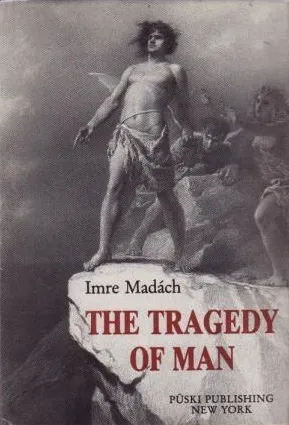The Tragedy of Man

Navigating the Cosmic Drama: Exploring "The Tragedy of Man" by Imre Madách
Introduction
Embark on a philosophical journey through time and space with "The Tragedy of Man" by Imre Madách. This Hungarian literary masterpiece isn't just a play; it's a cosmic exploration of the human experience. Join me as we delve into the depths of Madách's work, where existential questions, timeless dilemmas, and the human spirit collide.
The Cosmic Stage
A Theatrical Odyssey
Madách's "The Tragedy of Man" unfolds on a cosmic stage, spanning the entirety of human history. The characters, Adam and Lucifer, embark on an existential odyssey, confronting the complexities of morality, ambition, and the pursuit of meaning.
Personal Theatrical Echo
The cosmic setting resonated with memories of attending a play that transcended traditional narratives. Madách's decision to set the stage on a cosmic scale reminded me of the power of theater to transport audiences beyond the confines of everyday reality.
The Eternal Dilemmas
Moral Quandaries and Human Ambition
Through the characters of Adam and Lucifer, Madách explores profound moral dilemmas and the ceaseless ambition that defines humanity. The play dissects the human condition, questioning the choices that shape our destinies.
Anecdotal Moral Crossroads
The theme of moral dilemmas struck a chord as I reflected on moments in my own life where choices carried weighty consequences. Madách's exploration becomes a mirror, prompting readers to confront their own moral crossroads.
Timeless Philosophical Dialogues
Conversations with the Cosmic
Madách employs philosophical dialogues between Adam and Lucifer, engaging in debates that transcend time. These conversations delve into the essence of existence, morality, and the eternal struggle between good and evil.
Anecdotal Philosophical Echo
The idea of philosophical dialogues brought back memories of late-night discussions with friends, exploring the mysteries of the universe. "The Tragedy of Man" becomes a literary companion for those who revel in the complexities of existential discourse.
The Pursuit of Knowledge
Adam's Quest for Wisdom
Adam's insatiable thirst for knowledge becomes a central theme, echoing the biblical narrative. Madách portrays the relentless pursuit of wisdom as both a source of enlightenment and a catalyst for existential turmoil.
Personal Quest for Wisdom
The portrayal of Adam's quest resonated with a time in my life when the pursuit of knowledge became a driving force. Madách's depiction serves as a reminder of the dual nature of knowledge—an enlightening guide and a potential source of inner conflict.
The Human Spirit and Hope
Resilience Amidst Tragedy
Despite the cosmic tragedies woven into the narrative, Madách leaves room for the resilience of the human spirit. The play acknowledges the enduring hope that propels humanity forward, even in the face of existential challenges.
Anecdotal Resilience
Recalling moments of personal resilience during challenging times, "The Tragedy of Man" becomes a testament to the indomitable human spirit. Madách's work celebrates the capacity for hope that dwells within each of us.
Conclusion
As we conclude our exploration of "The Tragedy of Man" by Imre Madách, it's evident that this work isn't just a play; it's a cosmic mirror reflecting the grandeur and complexity of the human experience. Madách invites readers to ponder timeless questions, confront moral quandaries, and celebrate the enduring spirit that defines us.